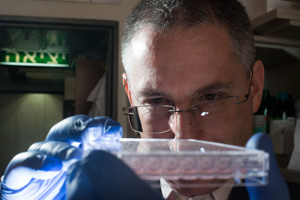
BGU Leads the Way Toward a Cure for Ebola
BGU Leads the Way Toward a Cure for Ebola
August 6, 2014
Israel21C — As the most severe Ebola epidemic on record spreads through Western Africa, infecting and killing hundreds of citizens and foreign aid workers, and raising the specter of outbreaks all over the world, an Israeli research team is working with survivors to develop antibodies against the lethal virus.
Dr. Leslie Lobel and fellow principal investigator Dr. Victoria Yavelsky have spent many years studying native immunity to Ebola and another equally lethal equatorial African virus, Marburg, at BGU’s Center for Emerging Diseases, Tropical Diseases and AIDS.
“Currently we’ve tracked all Ebola and Marburg virus survivors in Uganda, studied their immune responses to these viruses and identified survivors with a strong immune response,” he says. “We take blood samples from them and isolate monoclonal antibodies that neutralize the virus in our lab here at BGU.”
This approach is regarded as the most promising way to prevent Ebola and Marburg, and it could be available within five years.
Lobel travels to Africa about five times a year. “We have set up a base laboratory in Entebbe with our Ugandan colleagues, so that we can process human blood samples in under 12 hours from the time of collection, which is required for our work. After the samples are tested and deemed to be non-infectious, we ship them to Israel and our team here develops antibodies from the samples,” Dr. Lobel says.
With funding from the U.S. National Institutes of Health and other resources, Dr. Lobel’s lab is now getting ready to test its human monoclonal antibodies in mice and non-human primates. This will be performed abroad because no live virus research is permitted in Israel.
“We have a five-year plan and I believe we could have proof of concept with human monoclonal antibodies in monkeys in three to five years,” Dr. Lobel predicts. “If we can prove it in two animal models we can eventually use it in humans.”
He notes that the work being done at Ben-Gurion University is essential, since there are few studies on survivors of Ebola and there is no effective treatment thus far.




